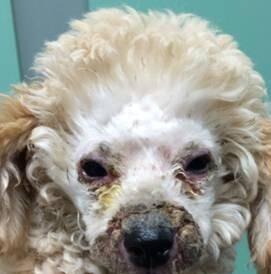Pyoderma is a purulent skin disease caused by skin infection with purulent bacteria, and is the final manifestation of many skin diseases.
I. Clinical symptoms of the case
The female dog, 3.5 kg, was sleeping in the kennel and was unwilling to exercise, depression, loss of appetite, weight loss, severe facial itching, and bleeding from scratching and rubbing the face, resulting in facial hair loss and scab formation.
Affected dogs have swollen pus around the eyes, mouth and nose, and large scabs

Affected dogs have swollen pus around the eyes, mouth and nose, and large scabs
II. Pathogenesis
A large number of bacteria live on the skin surface of all normal animals, and these normal flora contribute to the body's skin immunity.
III. Treatment measures
Scraping of skin flakes and pus from the affected part, laboratory diagnosis, combined with clinical examination, can confirm that the dog suffers from mixed infection of mites and fungi, and secondary bacterial (Staphylococcus intermedia) infection causes pyoderma.
Local treatment: First, cut off all the hair around the wound, remove the dirt, wash thoroughly with hydrogen peroxide or high-concentration necromide, clean the lesions, slowly squeeze out the pus or blood while washing, and then apply iodine tincture.
Shave the affected area, rinse the affected area with disinfectant, and carefully remove the scab
Remove the pus from the affected area and disinfect it with iodine
Systemic treatment: Staphylococcus intermedius, as the main pathogen of canine skin purulent infection and other infections, must be treated with antibiotics in order to prevent systemic infection after local cleaning.
After three days of treatment, the redness and swelling of the affected area disappeared
Symptoms improved significantly after five days of treatment
IV. Prevention and precautions
The disease requires a long period of time in the course of treatment, so try not to interrupt treatment in the middle.
In order to prevent the occurrence of pyoderma, owners should maintain environmental hygiene, feed clean food, regularly supplement vitamin B complex and vitamin C, and ensure adequate exercise every day.
